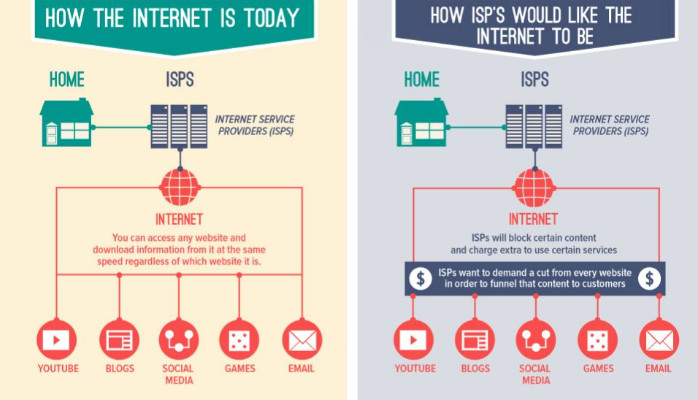
Save the Internet. Vote for #NetNeutrality
Recently, the second largest telecom in the United States, Verizon, and the content king of the internet, Google, reached an agreement which could determine the future of the internet. In effect, they agreed that the wireless internet i.e. internet on mobiles, which is almost universally accepted to become the main mode of internet access in the near future, need not be the public and egalitarian internet we all know and celebrate. Mobile internet would be more of an “Internet Mall”, where the mall owners –the telecom companies – will give selective access and priority to providers of goods and services who pay them handsomely. This is not science fiction. Just last month, in India, Airtel began providing Facebook free of data download charges. Meaning that even if you are not subscribed to the paid internet channel on Airtel, you still get the internet; it will be free, but only with Facebook on it. This month, Tata DoCoMo began providing a boutique of email and social networking sites for just INR 50, but the rest of the internet needs to be separately subscribed for, and is more expensive. Airtel’s Facebook offer and Tata DoCoMo’s boutique of select services breaks the hallowed net neutrality rule, and the Verizon-Google agreement sanctifies this transgression on the wireless internet. The internet will never be the same again; we may be witnessing the loss of the public internet forever.
Net Neutrality:
Net Neutrality is the Internet’s guiding principle: It preserves our right to communicate freely online. This is the definition of an open Internet.
Net Neutrality means an Internet that enables and protects free speech. It means that Internet service providers should provide us with open networks — and should not block or discriminate against any applications or content that ride over those networks. Just as your phone company shouldn't decide who you can call and what you say on that call, your ISP shouldn't be concerned with the content you view or post online.
Without Net Neutrality, cable and phone companies could carve the Internet into fast and slow lanes. An ISP could slow down its competitors' content or block political opinions it disagreed with. ISPs could charge extra fees to the few content companies that could afford to pay for preferential treatment — relegating everyone else to a slower tier of service. This would destroy the open Internet.
It’s important for access to knowledge, services and free speech, as well as freedom and ease of doing business online, for this access to be neutral:
– All sites must be equally accessible
- The same access speed at the telco/ISP level for each (independent of telco selection)
– The same data cost for access to each site (per KB/MB).
This means, Net Neutrality is about:
– No telecom-style licensing of Internet companies (see this and this)
– No gateways (Internet.org, Airtel OneTouch Internet, Data VAS), censorship or selection;
– No speeding up of specific websites (that may or may not pay telcos)
– No “zero rating” or making some sites free over others (and that goes for you too, Wikipedia and twitter).
http://www.savetheinternet.in/
If we want to maintain and enhance the Internet as an engine for growth, we must ensure that companies providing access should not be able to block, throttle, or otherwise restrict legal content and services of their users online, be it for commercial or political motivation. Of course, it is not just about blocking and throttling. It is also about stopping ‘positive discrimination’, such as when one internet operator favors one particular service over another. If we don’t explicitly outlaw this, we hand immense power to telcos and online service operators. In effect, they can become gatekeepers – able to handpick winners and the losers in the market and to favour their own sites, services and platforms over those of others. This would crowd out competition and snuff out innovative new services before they even see the light of day.
At the moment, there’s a very real danger that certain Indian retailers and service operators could become gatekeepers. There’s a proposal to introduce extra charges that will not only make the Internet significantly more expensive for consumers, but also give unfair advantages to companies like Flipkart that have opted to oppose net neutrality. Not just that, the proposal includes making the user pay for Internet in general and particular packages in addition to that basic fee. So you’d have to pay extra to use WhatsApp, access Facebook, watch a video on YouTube, and so on. TRAI’s consultation paper, (http://bit.ly/1Fp8m5G) which plans to allow telecom operators to block apps and websites in order to demand more money from consumers and businesses, could mark the end of the freedom to surf the web.
There was a big victory in US on February 26, 2015 when FCC approved strong open Internet rules under Title II of the Communications Act.
http://www.savetheinternet.com/sti-home
https://www.whitehouse.gov/net-neutrality
This is the time to act! Save Internet freedom in India. Support #NetNeutralityIndia. Spread the word.
Submit your response to TRAI http://www.savetheinternet.in/ . The deadline is April 24, 2015.
Note: The information above has been contributed through various online sources.